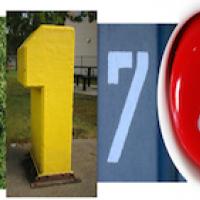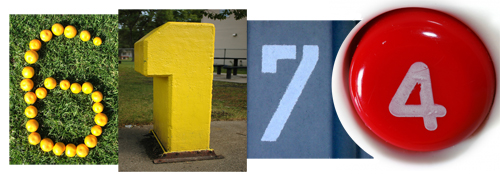
Mysterious 6174
I want to let you in on one of our favourite mathematical mysteries... To get started, choose a four digit number where the digits are not all the same (that is not 1111, 2222,...). Then rearrange the digits to get the largest and smallest numbers these digits can make. Finally, subtract the smallest number from the largest to get a new number, and carry on repeating the operation for each new number.
We'll show you what we mean with the number 2005. The maximum number we can make with these digits is 5200, and the minimum is 0025 or 25 (if one or more of the digits is zero, embed these in the left hand side of the minimum number). The subtractions are:
5200 - 0025 = 5175
7551 - 1557 = 5994
9954 - 4599 = 5355
5553 - 3555 = 1998
9981 - 1899 = 8082
8820 - 0288 = 8532
8532 - 2358 = 6174
7641 - 1467 = 6174
When we reach 6174 the process repeats itself, returning 6174 every time.

Now try with your four digit number... what do you get? I bet you'll get to 6174, every time, no matter what number you chose! Try a few more and see if you believe me!
Do you think we always reach the mysterious number 6174? If we do, why do you think that happens? If this mystery piques your interest, then you can find out why in this excellent article by Yutaka Nishiyama. This question has been intriguing Plus readers for years, and Yutaka's article remains one of our most popular articles, generating reams of comments, emails and discussions. And spoiler alert - 6174 isn't the only number with these special numbers - but you'll have to try the same process with three digit numbers, or read the article, to find out!
Comments
Aziz Inan
This is very interesting, thanks for posting it!
I understand that the digits of the four-digit number chosen should not be all equal (AAAA) for this process to work but are there other four-digit number exceptions that won't yield 6174 through this process? For example, what about number 1000?
Thanks again,
Aziz Inan
Aziz Inan
I now realize that I must always keep the result of each subtraction as a four-digit number. The trap I fell into was 1000 - 0001 = 999 instead of 0999. :-(
Thanks again!
Aziz Inan
Pawan Kumar B.K.
I tried with 2035. I found true. Amazing!
Anonymous
yes 2035
Maglin Shelcia
Yeah! It's really amazing. I too tried it with 1704.
7410-0147 = 7263
7632-2367 = 5265
6552-2556 = 3996
9963-3699 = 6264
6642-2466 = 4176
7641-1467 = 6174
Somebody
I'm amazed! It's so amazing!
ubatdongsan
Do you think we always reach the mysterious number 6174? If we do, why do you think that happens
________________
https://ubatdongsan.vn
Rinaldi
I've followed the same approach with two and three digit numbers. Here are some interesting observations after a few iterations:
* three digit numbers
is 495 the magic number for three digit numbers?
example 1 example 2
100 - 001 = 099 920 - 029 = 891
990 - 99 = 891 981 - 189 = 792 (eventually 495)
981 - 189 = 792
972 - 279 = 693
963 - 369 = 594
954 - 459 = 495
954 - 459 = 495
* Two digit numbers
For two digits the process does not "converge" to an exact result or mysterious number instead you may get caught up in a loop:
i(1) 84 - 48 = 36
(2) 63 - 36 = 27
(3) 72 - 27 = 45
(4) 54 - 45 = 09
(5) 90 - 09 = 81
(6) 81 - 18 = 63 this is the largest digit from the result of iteration (1).
Example 2:
91-19 = 72 ( largest from iteration 2 from example 1)
72 - 27 = 45
54 - 45 = 09
90 - 09 = 81
81 - 18 = 63
what about 5,6, ..., n digit numbers? Is there a way to find all the "mysterious numbers"?
Stargazer
If you want to try it the easy way you can choose the actual magical number 6174, it renders down to only one subtraction:
6174 =>
7641-1467 = 6174
Snowflake
This was weird and hard to figure out!